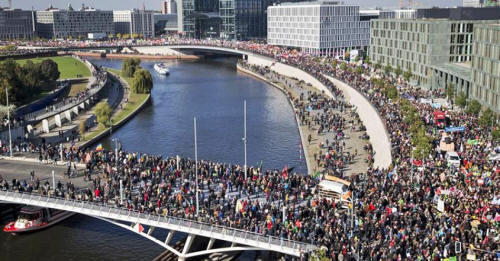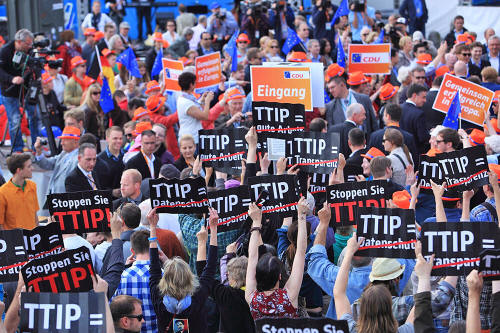|
from AltHealthWorks Website
drew hundreds of thousands. PHOTO: EFE/EPA/KAY NIETFELD
Despite its Earth-shattering status as one of the biggest and most controversial trade deals we've seen in many years, the TTIP (Transatlantic Trade and Investment Partnership) has received very little coverage in the U.S. media.
But protests and opposition to this Pro-Corporate Dream Bill has raged across Europe. And in America, another similar deal that directly affects us, the Trans-Pacific Partnership (TPP) looms in Congress.
If passed, the TTP will make passage of the TTIP easier.
In Europe alone, over 3 million signatures have been gathered by the website Stop TTIP.
This past Saturday, over 250,000 people turned out against the secretive trade deal in what's being called the biggest rally in Germany in many, many years - and with what's at stake for people who care about,
...it's easy to understand why.
Dangers of the TTIP - Monsanto's Dream Deal?
German protesters from this past summer.
While Americans fight for the right to GMO labeling and stop the DARK Act here, as many as 19 countries in the EU have instituted bans on GMOs, including Germany.
But if passed the TTIP could create several avenues for the United States to spread its unwanted to, In Berlin, among the 250,000+ protesters were environmental groups and anti-corporate globalization groups. They marched from the main railway station in central Berlin to the nation's parliamentary building.
One group even dragged a giant "Trojan Horse" through the streets to demonstrate how the deal is being rammed through with no regard to the damage it would do to everyday people.
If passed, the TTIP could:
According to CorporateEurope.org, the number one lobbying interest for the deal is Agribussiness - and Monsanto is pushing hard for the TTIP, the United States' "Trojan Horse" in Europe.
Stopping to TPP at Home (...and Big Pharma)
As mentioned earlier the TPP is the first step in this trade deal juggernaut that has been crafted in secrecy on behalf of multi-national corporations.
Organizations such as Food & Water Watch are urging people to contact their reps. in Congress asking them to reject the TPP.
PHOTO: Wikileaks
With so many acronyms out there and so much going on it's easy to get confused.
But the TPP is essentially a trade deal with the U.S. and these countries:
According to recent leaks the TPP is heavily biased in favor of drug companies and could lead to unsafe food imports from other countries.
It could also force generic drugs to take even longer for approval, putting people who take certain prescriptions at the mercy of drug companies, which could lead to serious drug price increases.
The TPP has been called "the biggest global threat to the Internet."
If you'd like to voice your opinions on the TPP, which was finalized this month is still yet to be voted on, you can contact Congress by clicking here. One opponent is Florida Rep. Alan Grayson, who released the following below video about the dangers of the TPP and other trade bills.
The TPP likely won't be voted on until 2016, but that gives us plenty of time to learn and let our reps know how we feel.
This is how Grayson feels:
|





